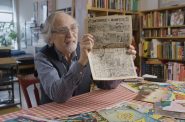“The Master”
Mark Metcalf reviews Paul Thomas Anderson's "The Master," opening tonight at the Oriental Theatre.

“The Master” opens Friday, Sept. 21, at the Oriental Theatre.
Sometime in the late forties or early fifties the notion about what acting was began to change. It is usually associated with Marlon Brando and James Dean, but the movement had begun with the American interpretation of what Constantine Stanislavsky was trying to create in Russia early in the 20th century.
It boiled down to the difference between “pretending” and “being.” Most people still think that actors are pretending when we see them on stage or screen. Most actors probably are. It could be said that they are “lying.” They are putting on a “show.”
But some actors, the ones we celebrate the most, the ones we want to see, are working with what they take to be the truth toward a sense of actually being, or becoming the character. They are giving up bits and pieces of themselves in order to inhabit the character. It you want to get spiritual about it there is a bit of a sacrifice going on. Or if you are more scientific, the psychologist might say that there is a surrender of the self. There is a great deal of power and intensity manifested when a person surrenders their identity. What are we when we are no longer ourselves? The social norm says we are mad. Consequently actors are loved at one level and feared at another and those levels are often not so far apart.
The last film that Paul Thomas Anderson directed, There Will Be Blood, had such a strong performance at it’s center, a performance that—as much as any I had seen at the time—described a meeting point between the old way of “pretending” and this new way of “acting as being.” The immersion of Daniel Day-Lewis into the character of Daniel Plainview, very act of surrender of the self, created such focus of energy that it overwhelmed the film. Anderson, it could be said, also surrendered. He surrendered the momentum of his idea, his film, to the strength and power of the performance of one actor. It didn’t make for a bad film. It made for a good film surrounding a great performance. It blurred the edges of many of the ideas in the film much the way that playing Glenn Gould too loudly crushes the nuance of Bach. Perhaps by that action he kept it from being a great film.
The story is relatively simple. A man, Phoenix, returns from World War II bent but not broken, a creator of his own dangerous elixir, an alcoholic, and a drifter. He finds his way onto the yacht of a guru, a shaman, “a nuclear physicist,” and a preacher of The Cause. Hoffman’s character, in many ways, resembles L. Ron Hubbard, the creator of Scientology. Phoenix’s Freddy is man as animal. Hoffman’s Lancaster Dodd is man struggling to ascend beyond his animal nature. The two are drawn to each other because they must defeat and destroy each other. They are two halves of the same person. They are lovers. They are men. And, as the man says, thereby hangs a tale.
The filmmaking is extraordinary. There are no happy endings. There is no satisfaction. There are endless questions. But there are also two perfectly matched performances. And Amy Adams as Dowd’s wife is so strong that she seems to drive them both.
The Master opens Friday Sept. 21 at the Oriental Theatre on Farwell.
For more of ThirdCoast Digest‘s film coverage, including Mark Metcalf’s Moving Pictures reviews, click here.
Movies
-
Republican Legislators Push Tax Credits for Films Made in Wisconsin
 May 21st, 2025 by Baylor Spears
May 21st, 2025 by Baylor Spears
-
Mystery Movie Being Filmed in Milwaukee With Kevin Spacey
 Apr 24th, 2025 by Jeramey Jannene
Apr 24th, 2025 by Jeramey Jannene
-
Two Documentaries Offer Lessons in Fame
 Apr 24th, 2025 by Dominique Paul Noth
Apr 24th, 2025 by Dominique Paul Noth


















